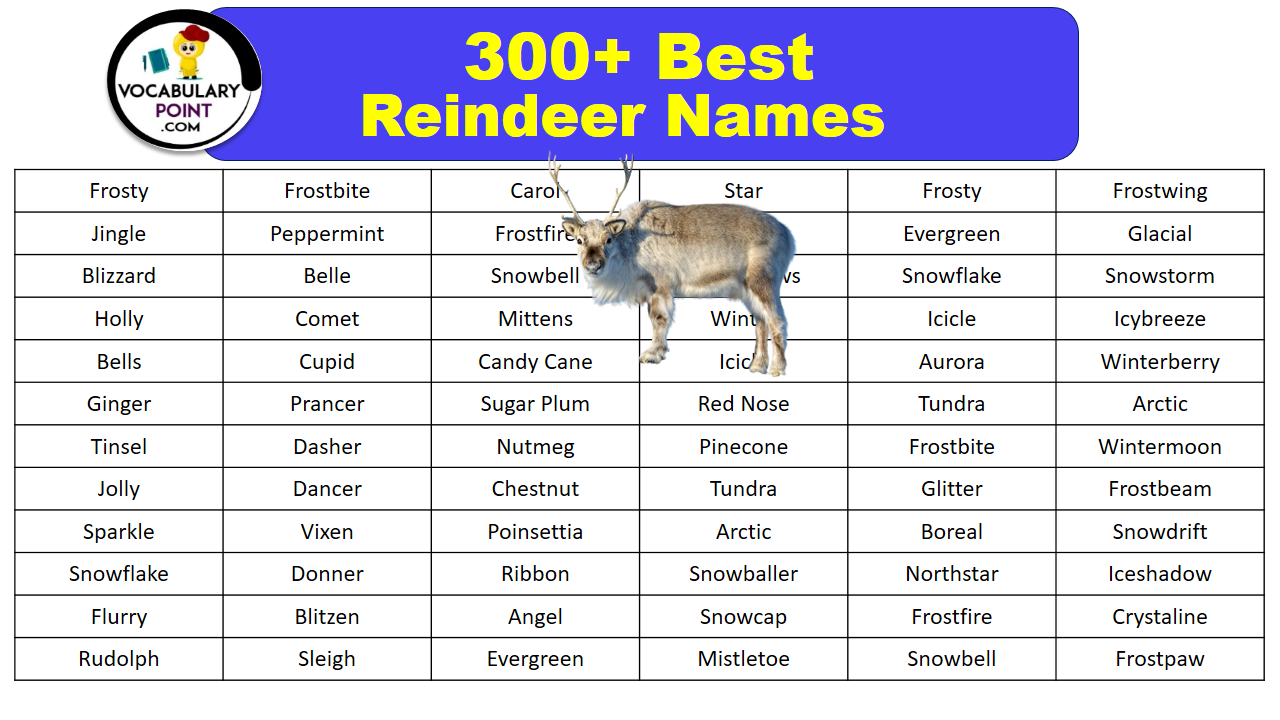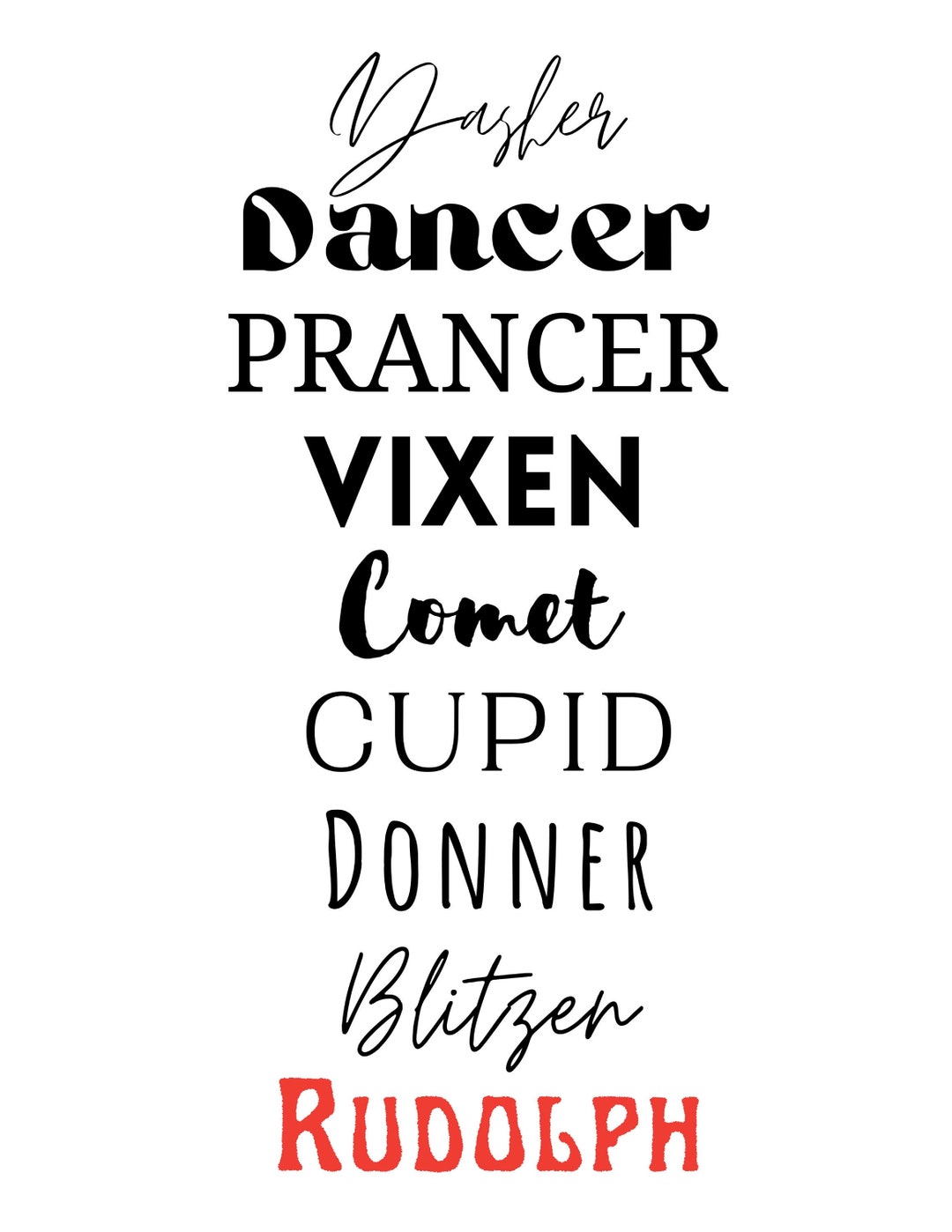Reindeer Names Donner Or Donder: A Comprehensive Guide To Santa's Magical Helpers
Reindeer names Donner or Donder have sparked curiosity and debate for generations. These legendary creatures have captured the hearts of millions through their association with Santa Claus and the timeless tale of Christmas magic. But what exactly is the story behind these names, and why does it matter? In this article, we will delve into the fascinating history, significance, and cultural impact of Donner and Donder, shedding light on the origins of these iconic reindeer names.
Every year, as Christmas approaches, the world is reminded of the magical journey undertaken by Santa and his team of flying reindeer. Among the most beloved members of this team are Donner and Donder, whose names have become synonymous with holiday cheer and tradition. Understanding the nuances of these names not only enriches our appreciation of Christmas folklore but also highlights the cultural significance of reindeer in global celebrations.
This article aims to provide a thorough exploration of the topic, offering insights into the history, etymology, and cultural relevance of Donner and Donder. Whether you're a fan of Christmas traditions or simply curious about the origins of reindeer names, this guide will serve as a valuable resource. Let's dive in and uncover the enchanting world of Santa's flying companions!
Read also:Bossip News Page 2 Unveiling The Latest Updates And Breaking Stories
Table of Contents
- The History of Reindeer Names
- Donner or Donder: The Name Debate
- The Origin of Reindeer Names
- Cultural Significance of Reindeer Names
- Reindeer in Christmas Tradition
- Famous Literature and Media References
- Fun Facts About Donner and Donder
- Frequently Asked Questions
- Conclusion
The History of Reindeer Names
The tradition of naming Santa's reindeer dates back to the early 19th century, with the publication of the famous poem "A Visit from St. Nicholas," also known as "The Night Before Christmas." Written by Clement C. Moore in 1823, this poem introduced the world to the eight flying reindeer that pull Santa's sleigh. Among these names were Dasher, Dancer, Prancer, Vixen, Comet, Cupid, Donder, and Blitzen.
Initially, the name "Donder" was used in Moore's original poem, but over time, variations such as "Donner" began to appear in different adaptations. This shift in spelling reflects the evolution of language and cultural influences on Christmas traditions.
Evolution of Reindeer Names
As the story of Santa's reindeer spread across continents, variations in spelling and pronunciation emerged. The name "Donner," for instance, is believed to have been influenced by German culture, where "Donner" means "thunder." This linguistic adaptation highlights the global reach of Christmas traditions and the way they are shaped by local customs.
- Donder - Original spelling from Clement C. Moore's poem.
- Donner - Modern variation influenced by German language.
Donner or Donder: The Name Debate
One of the most intriguing aspects of reindeer names is the ongoing debate between "Donner" and "Donder." While both names are widely recognized, their usage varies depending on cultural and regional preferences. Understanding the differences between these names requires a closer look at their historical and linguistic roots.
In the United States, "Donner" has gained more popularity, particularly in modern adaptations of Christmas stories. However, "Donder" remains a cherished part of the original poem and continues to be used in traditional contexts.
Read also:Chavez Funeral Home In Santa Rosa New Mexico A Comprehensive Guide
Why Does the Name Matter?
The choice between Donner and Donder is not merely a matter of spelling but reflects deeper cultural and linguistic connections. For many, the name "Donder" evokes a sense of nostalgia and authenticity, tying back to the origins of Christmas folklore. On the other hand, "Donner" represents a more contemporary interpretation, resonating with audiences familiar with Germanic influences.
The Origin of Reindeer Names
The names of Santa's reindeer were carefully chosen to reflect their unique qualities and roles in the Christmas narrative. Each name carries symbolic meaning, contributing to the enchantment of the story. For instance, "Donder" (or "Donner") represents thunder, emphasizing the power and majesty of the reindeer as they soar through the night sky.
Understanding the etymology of these names provides insight into the creative process behind the poem and the enduring appeal of Santa's team.
Symbols and Meanings
- Donder/Donner - Thunder, symbolizing strength and speed.
- Blitzen - Lightning, representing agility and brilliance.
- Dasher - Speed and excitement.
- Dancer - Grace and elegance.
Cultural Significance of Reindeer Names
Reindeer names like Donder and Donner have transcended their origins in literature to become integral parts of global Christmas culture. In many countries, these names are used in songs, movies, and holiday traditions, cementing their place in the collective imagination.
For children around the world, the reindeer represent hope, magic, and the joy of giving. Their names serve as a reminder of the universal values embodied by Christmas: kindness, generosity, and togetherness.
Reindeer in Global Traditions
While the story of Santa's reindeer originated in Western cultures, it has been embraced by communities worldwide. In Scandinavia, for example, reindeer are revered as symbols of winter and survival, while in Japan, they are seen as bringers of good fortune. These cultural adaptations highlight the universal appeal of reindeer names like Donder and Donner.
Reindeer in Christmas Tradition
Santa's reindeer play a central role in the celebration of Christmas, embodying the spirit of the holiday. From caroling to gift-giving, their presence is felt in countless traditions that bring families and communities together. The names Donder and Donner, in particular, have become synonymous with the magic of Christmas night.
As part of the Christmas narrative, the reindeer inspire stories of adventure and wonder, capturing the imaginations of people of all ages.
Reindeer in Popular Media
Over the years, Santa's reindeer have been featured in numerous movies, TV shows, and books, further cementing their place in popular culture. From "Rudolph the Red-Nosed Reindeer" to modern adaptations like "The Polar Express," these stories continue to delight audiences worldwide.
Famous Literature and Media References
Reindeer names like Donder and Donner have been immortalized in classic literature and media, ensuring their legacy for generations to come. Some of the most famous references include:
- "A Visit from St. Nicholas" by Clement C. Moore
- "Rudolph the Red-Nosed Reindeer" by Robert L. May
- "The Polar Express" by Chris Van Allsburg
These works not only entertain but also educate readers about the rich history and cultural significance of Santa's reindeer.
Impact on Modern Media
In recent years, the reindeer have been reimagined in various forms, from animated films to video games. These adaptations continue to expand the reindeer's role in popular culture, keeping their names and stories alive for new audiences.
Fun Facts About Donner and Donder
Here are some interesting facts about Donner and Donder that you may not know:
- Donner and Donder are often depicted as the strongest members of Santa's team.
- Their names are derived from German words for thunder and lightning.
- In some versions of the story, Donner and Donder are siblings.
These fun facts add depth to the reindeer's characters, making them even more endearing to fans of all ages.
Frequently Asked Questions
Here are some common questions about Donner and Donder:
- What is the difference between Donner and Donder? Donner is a modern variation influenced by German language, while Donder is the original spelling from Clement C. Moore's poem.
- Why are reindeer names important? Reindeer names like Donner and Donder symbolize the magic and wonder of Christmas, connecting people to the traditions and stories of the season.
- Are Donner and Donder real? While they are fictional characters in the context of Christmas folklore, their names and stories are based on real reindeer and cultural traditions.
Conclusion
In conclusion, the debate between Donner and Donder highlights the rich history and cultural significance of Santa's reindeer. Whether you prefer the original spelling or the modern variation, these names evoke the magic and joy of Christmas traditions. By understanding their origins and meanings, we can appreciate the enduring appeal of these legendary creatures.
We invite you to share your thoughts and experiences with Donner and Donder in the comments below. Join the conversation and help spread the holiday cheer! For more fascinating insights into Christmas traditions, explore our other articles and resources.

/santa-reindeer-56a9a2995f9b58b7d0fd8fd0.jpg)
